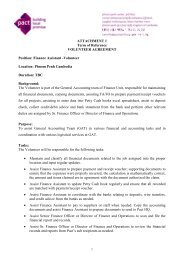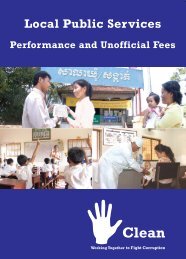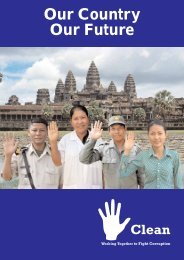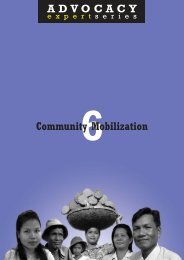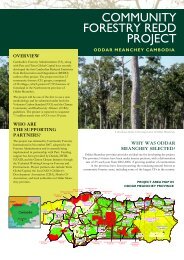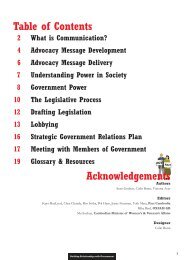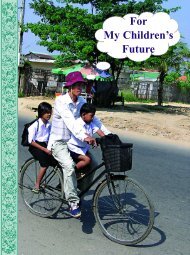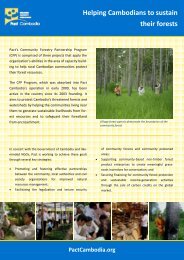Advocacy in Cambodia: Increasing Democratic ... - Pact Cambodia
Advocacy in Cambodia: Increasing Democratic ... - Pact Cambodia
Advocacy in Cambodia: Increasing Democratic ... - Pact Cambodia
Create successful ePaper yourself
Turn your PDF publications into a flip-book with our unique Google optimized e-Paper software.
economic issues NGOs are advocat<strong>in</strong>g on (such<br />
as control of land and fisheries resources), so there<br />
are fewer barriers to engagement than <strong>in</strong> other<br />
sectors. The abundance of HIV resources flow<strong>in</strong>g<br />
to <strong>Cambodia</strong>n NGOs from <strong>in</strong>ternational assistance<br />
agencies also places NGOs <strong>in</strong> a position of leverage,<br />
as NGOs can help government agencies<br />
implement programs. Limited technical and<br />
human resource capacity are perhaps the ma<strong>in</strong><br />
barriers to engagement between civil society and<br />
the government on HIV/AIDS policies.<br />
Build<strong>in</strong>g Capacity of Grassroots Organizations<br />
and NGOs<br />
The HIV/AIDS sector <strong>in</strong> <strong>Cambodia</strong> is<br />
comprised of a good mix of HIV-dedicated<br />
organizations and NGOs with HIV components.<br />
There is still ample opportunity for capacity<br />
build<strong>in</strong>g of the sector, however. The objective of<br />
HIV education is to change behavior, a difficult<br />
task which requires considerable skill. For the<br />
better part of the 1990s, HIV/AIDS capacity<br />
build<strong>in</strong>g has focused on provid<strong>in</strong>g technical and<br />
tra<strong>in</strong><strong>in</strong>g skills to HIV educators, program<br />
implementers, and medical professionals.<br />
Accord<strong>in</strong>g to AIDS experts, these capacity areas<br />
rema<strong>in</strong> limited among a significant number of<br />
NGOs.<br />
It is therefore not surpris<strong>in</strong>g that HIV<br />
advocacy, which requires very sophisticated skills,<br />
cont<strong>in</strong>ues to be limited <strong>in</strong> <strong>Cambodia</strong>. As <strong>in</strong> other<br />
sectors, for many, HIV advocacy cont<strong>in</strong>ues to be<br />
an abstract concept and NGOs need to learn how<br />
to make the issue more relevant to themselves,<br />
their constituencies, and potential HIV advocates.<br />
HIV advocacy cont<strong>in</strong>ues to focus primarily on<br />
education and awareness rais<strong>in</strong>g activities.<br />
The exclusion of HIV+ people <strong>in</strong> policy<br />
formulation is an obvious weakness <strong>in</strong> the sector.<br />
As cited <strong>in</strong> the case studies on other sectors<br />
presented <strong>in</strong> this report, observers state that some<br />
NGOs are paternalistic <strong>in</strong> their relationships with<br />
people liv<strong>in</strong>g with AIDS, view<strong>in</strong>g them as<br />
beneficiaries rather than constituencies that need<br />
to be enabled to speak for themselves. For this<br />
reason it is important for NGOs to forge closer ties<br />
with the grassroots level. Creation of the CPN+<br />
networks is an important first step <strong>in</strong> empower<strong>in</strong>g<br />
what unfortunately will become a grow<strong>in</strong>g<br />
constituency of PWAs <strong>in</strong> <strong>Cambodia</strong>.<br />
HEALTH SECTOR<br />
NGOs work<strong>in</strong>g <strong>in</strong> the health sector benefit<br />
from the presence of the MEDICAM, a strong<br />
network<strong>in</strong>g organization whose large<br />
membership is crucial to build<strong>in</strong>g credibility<br />
with donors and the M<strong>in</strong>istry of Health. Health<br />
sector NGO relations with the government are<br />
particularly strong compared to other sectors,<br />
and for the past decade NGO representatives<br />
have been <strong>in</strong>vited to attend the monthly<br />
Coord<strong>in</strong>at<strong>in</strong>g Committee meet<strong>in</strong>g hosted by<br />
the M<strong>in</strong>istry of Health. This provides an<br />
important opportunity for NGOs to advocate<br />
for further NGO participation <strong>in</strong> health issues.<br />
Over the years, MEDICAM has hosted a<br />
number of work<strong>in</strong>g groups that were formed<br />
to address issues and then disbanded when<br />
they were no longer practical to organize.<br />
Current work<strong>in</strong>g groups <strong>in</strong>clude the Health<br />
Sector Reform Th<strong>in</strong>k Tank and the Health <strong>in</strong><br />
the Prison work<strong>in</strong>g group. In 1999 and 2000,<br />
a Community Participation <strong>in</strong> Health work<strong>in</strong>g<br />
group prepared feedback for the M<strong>in</strong>istry,<br />
which was <strong>in</strong>corporated <strong>in</strong>to the M<strong>in</strong>istry’s<br />
guidel<strong>in</strong>es for community participation issued<br />
<strong>in</strong> 2001.<br />
NGOs took a pro-active approach to health<br />
sector reform by hir<strong>in</strong>g a consultant to collect<br />
experiences and lessons learned from various<br />
agencies that were <strong>in</strong>volved <strong>in</strong> health sector<br />
reform pilot projects, and presented the<br />
f<strong>in</strong>d<strong>in</strong>gs to the M<strong>in</strong>ister of Health. In February<br />
2002, MEDICAM organized a national<br />
conference for NGOs, directors of the<br />
prov<strong>in</strong>cial Departments of Health referral<br />
hospitals, and M<strong>in</strong>istry of Health staff. The<br />
conference allowed NGOs to express their<br />
concerns and experiences regard<strong>in</strong>g health<br />
sector reform.<br />
References<br />
NGO Statement to the 2001 Consultative Group Meet<strong>in</strong>g on<br />
<strong>Cambodia</strong>. CCC, MEDICAM, NGO Forum.<br />
Case Studies<br />
91






